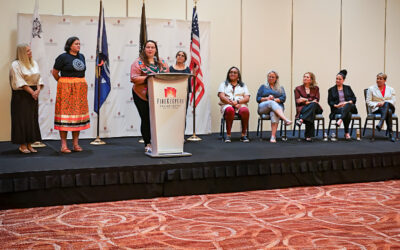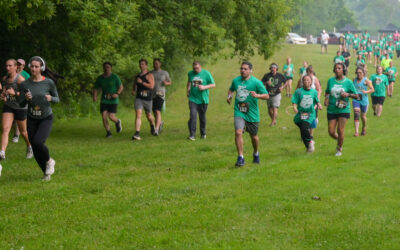Food sovereignty encompasses many facets of life: The ways we eat, grow, package, shop and prepare our food shape and govern how we lead our lives.
NHBP Food Sovereignty Coordinator Nickole Keith, hired in June 2021, understands the complexities and the universal role food plays in all our lives.
“For me, food is at the center of what we do; I see it correlate to everything,” Keith said. “Food sovereignty is getting back to our old ways of doing things, bringing us back together.”
According to the U.S. Food Sovereignty Alliance, the principles of food sovereignty focus on food for people, placing value on food providers and localized food systems that bring producers and consumers closer together, as well as on building knowledge and skills at the local level of food production, including sustainability and using valuable information that has been passed down over generations.
Thanks to a 3-year-funded grant, the Food Sovereignty program at NHBP has well-outlined goals to accomplish by September 2022:
- Introducing foods that are culturally appropriate and re-adopting an Indigenous-based diet by finding the foods that occupied the Great Lakes Region prior to colonization.
- Creating a food pantry designed to distribute hard-to-get items, such as wild game, Rice, canned goods, Native corn products and Medicines.
- Increasing Tribal Members’ access and knowledge or teachings by introducing Indigenous Lifeway Consultants, and mentors that have specific knowledge in different areas. The Lifeway Consultants will share Neshnabé teachings about Traditional food and lifeways, including harvesting, trapping, fishing, hunting, gardening, preparation, and culturally significant plants and animals.
- Introducing gardening, foraging, hunting and fishing to Members who either might not have been shown these things growing up or who seek more traditional ways of doing these things. Tribal Members who would like opportunities to be re-educated or reintroduced to these teachings also have the opportunity to participate.
“I am honored to have Tribal Council trust me with this important endeavor,” Keith said. “Food is integral to my extended family, as well as my Community. I am here to serve our Tribal Members, as this is my family. We have high rates of diabetes, high blood pressure and obesity in our Community. I want to help everyone live longer, live their best lives possible. Through food, this is a great way for us to help each other.”
Keith encourages any Tribal Member to engage and participate, whether that’s through a phone call or email to her – or even through the ever-growing Facebook page, “NHBP Food Sovereignty.” Since Keith has taken the helm as coordinator, the Facebook page more than doubled in size in a mere six months, with currently nearly 400 members as of publication.
“We are still working to lay out what our next courses of action are for NHBP for Food Sovereignty, all the while focused on increasing Tribal Members’ knowledge and participation,” Keith said. “These are exciting times.”
To reach out to Keith with ideas, please email Nickole.Keith@hbp-nsn.gov or call at 269.704.8515. You may also join the conversation on NHBP’s Facebook group at www.facebook.com/groups/foodsovereigntynhbp.




0 Comments